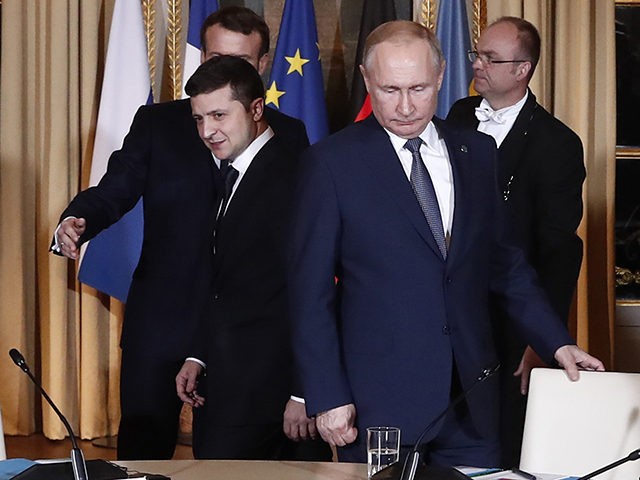Russia and Ukraine are far more likely to negotiate an end to their war if Republicans win either house of the U.S. Congress in the upcoming midterm elections than if Democrats retain full control.
House Minority Leader Kevin McCarthy (R-CA) warned Tuesday that the era of the “blank check” for the war effort will end if the GOP wins a majority.
While there are plenty of Republicans who support the war effort, they are unlikely to rubber-stamp President Joe Biden’s war funding, as the Democratic Congress has done.
Democrats and their media allies are already hard at work spinning McCarthy’s statement as some kind of statement of loyalty to Russian President Vladimir Putin.
Ironically, for decades, Democrats were the pro-Russia party. President Barack Obama and Secretary of State Hillary Clinton tried to “reset” relations, which they claimed (erroneously) had been damaged by George W. Bush. They appeased Russia until Putin shocked them by seizing Crimea in 2014, playing by what they complained were “19th century rules.”
When “neocons” like Sen. John McCain (R-AZ) talked about defending Ukraine and other pro-Western former Soviet republics, in the wake of Putin’s invasion of Georgia in August 2008, they were vilified as “warmongers.”
Obama went further, shocking Poland and the Czech Republic, the closest U.S. allies in Eastern Europe, by pulling out of a missile defense agreement that Bush had negotiated precisely to prevent Russia from intimidating its former satellites. The result was the Crimea invasion.
After the 2016 election, Democrats viewed Putin and Russia through the lens of domestic politics, blaming “Russia collusion” and Russian interference for Donald Trump’s surprise victory. The irony was that Trump was far harder on Russia, in a practical sense, than Obama had ever been, or that Hillary Clinton would have been.
As soon as President Joe Biden took office, he lifted sanctions on Russia’s strategic Nord Stream 2 pipeline as a gesture of goodwill — one that Putin, quite reasonably, interpreted as weakness.
After the disastrous Afghanistan withdrawal, Biden looked even worse. He had no plan to deter Russia from invading Ukraine — and now he seems to have no plan for bringing the conflict to a successful conclusion. He has spent over $50 billion on Ukraine, helping it defend its borders while America’s own southern border remains unprotected (by choice).
Not once has the public been told what America’s goal is in Ukraine. There seems to be a vague idea that Putin will retreat completely from all of Ukraine, or disappear.
Thus, the president who took office claiming that “diplomacy is back” has offered almost no diplomacy — and has even appeared to undermine the prospect of talks. Last month, he proclaimed “an era of relentless diplomacy” at the United Nations, but excluded Russia from that diplomatic outreach.
Granted, Putin had just hinted about the potential use of nuclear weapons, and there was a need to avoid any response that suggested weakness. But since the nuclear threat is real, albeit remote, an alternative to war seems urgent.
Ukrainian President Volodymyr Zelensky, whom the Biden administration expected to scurry into exile, has performed heroically, defending his country’s capital and taking the fight to the border region. But he has often shocked foreign audiences with belligerent rhetoric, perhaps taking his cues from Biden.
There are domestic reasons, perhaps, for him to reject talks while a single Russian soldier remains on his territory. But he cannot achieve that result on his own — and the world does not want to follow him to hell.
Biden risks blundering his way into the “nuclear Armageddon” that he warned a private gathering of rich Democratic Party donors about.
Perhaps Biden — or his advisers — believe that they are close to removing Putin’s Russia as a geopolitical threat. But there is no post-Putin government that would find substantial common ground with the U.S. at this point.
Biden has also pushed Russia into a closer alliance with China, undoing the hard work of half a century of American foreign policy, which aimed at dividing the two.
The path ahead has been clear for months: there have to be talks, even as fighting continues, about future security for Europe.
Elon Musk, who has given Ukraine his Starlink satellite network for free, suggested recently that he is no longer willing to do so. That was portrayed as greed and treachery by Ukraine and the Democrats, but it was a necessary and overdue nudge toward diplomacy.
And when one-party rule ends in Washington, the cost of the war will — or should — force Biden to propose talks. If we are lucky.
Joel B. Pollak is Senior Editor-at-Large at Breitbart News and the host of Breitbart News Sunday on Sirius XM Patriot on Sunday evenings from 7 p.m. to 10 p.m. ET (4 p.m. to 7 p.m. PT). He is the author of the recent e-book, Neither Free nor Fair: The 2020 U.S. Presidential Election. His recent book, RED NOVEMBER, tells the story of the 2020 Democratic presidential primary from a conservative perspective. He is a winner of the 2018 Robert Novak Journalism Alumni Fellowship. Follow him on Twitter at @joelpollak.

COMMENTS
Please let us know if you're having issues with commenting.